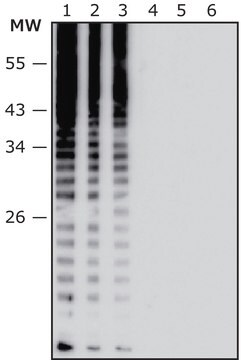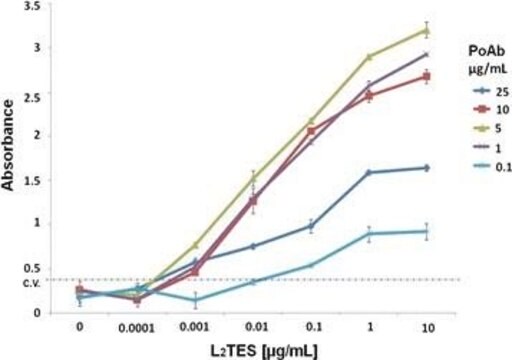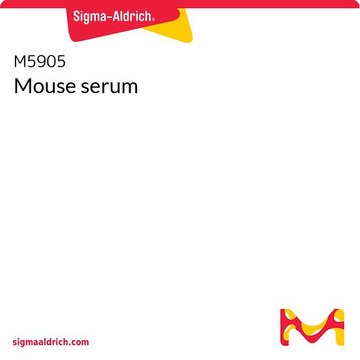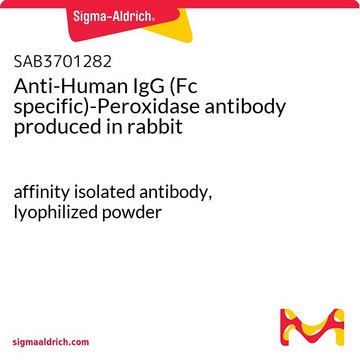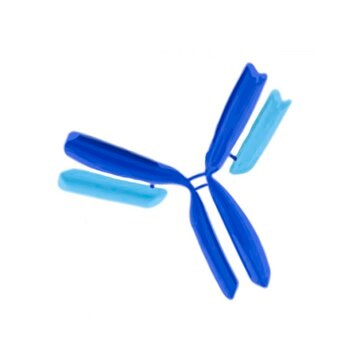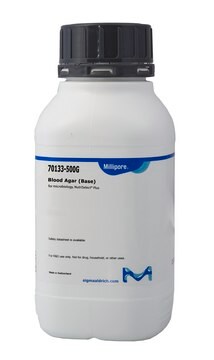추천 제품
생물학적 소스
rabbit
Quality Level
항체 형태
IgG fraction of antiserum
항체 생산 유형
primary antibodies
양식
liquid
종 반응성
(Salmonella enterica typhimurium)
포장
pkg of 100 μL
pkg of 25 μL
농도
~1 mg/mL
기술
immunoblotting: 1:2000-1:4000 using Salmonella enterica typhimurium LPS
indirect ELISA: 1:2000-1:4000 using using whole Salmonella
배송 상태
dry ice
저장 온도
−20°C
타겟 번역 후 변형
unmodified
일반 설명
Salmonella is a genus of Gram-negative, facultative anaerobe, motile bacillus composed of 2579 different serotypes. Salmonella is considered to be one of the most studied microorganisms as a worldwide foodborne pathogen and a major cause of gastrointestinal human infections.1 S. enterica is a subspecies of S. enterica, that includes 1531 serotypes, among them S. typhimurium and S. enteritidis, responsible for common human illness and thus focus of extensive research.1
특이성
almonella enterica typhimurium antibody recognizes S. enterica typhimurium whole lysate of dead bacteria and S. enterica typhimurium Lipopolysaccharides (LPS), the antibody has no cross reactivity with whole bacterial extracts of E. coli K-12 and E. faecalis.
애플리케이션
The antibody may be used in various immunochemical techniques including Immunoblotting and ELISA. Detection of the S. typhimurium bands by Immunoblotting is specifically inhibited by the immunogen.
생화학적/생리학적 작용
S. typhimurium can survive the acidic environment ofthe stomach through the activation of acid tolerance response (ATR), which maintains the intracellular pH
higher than the extracellular pH.6 Then, S. typhimurium penetrates the mucus barrier of the intestinal wall and adheres to the epithelium to initiate the infection, that may results in diarrhea, loss of electrolytes and local inflammation of the intestine.7-9
After S. typhimurium is being engulfed by enterocytes, it forms intracellular phagosomal compartments, termed Salmonella-Containing Vacuoles (SCV) where the bacterium is able to survive and multiply.2,9 S. typhimurium has various virulence factors, most of them are enoced by genes located in the Salmonella Pathogenicity Islands (SPI).10 S. typhimurium uses flagella for motility after ingestion11 and then type I fimbrae12 and adhesins to adhere to the epithelium. It expresses Type III Secretion System (T3SS) that enables the bacteria to inject into the host cells a variety of effector proteins such as, SipABCD, SptP, SpiC and SopB that alter cellular functions to promote bacterial invasion, survival and propagation.2,13,14 Moreover, S. typhimurium is able to form resistant biofilms15 that contribute to the establishment of chronic, ""carrier state"" infections. In addition, human specific S. typhiis used as a model for the animal study of typhoid fever.16
higher than the extracellular pH.6 Then, S. typhimurium penetrates the mucus barrier of the intestinal wall and adheres to the epithelium to initiate the infection, that may results in diarrhea, loss of electrolytes and local inflammation of the intestine.7-9
After S. typhimurium is being engulfed by enterocytes, it forms intracellular phagosomal compartments, termed Salmonella-Containing Vacuoles (SCV) where the bacterium is able to survive and multiply.2,9 S. typhimurium has various virulence factors, most of them are enoced by genes located in the Salmonella Pathogenicity Islands (SPI).10 S. typhimurium uses flagella for motility after ingestion11 and then type I fimbrae12 and adhesins to adhere to the epithelium. It expresses Type III Secretion System (T3SS) that enables the bacteria to inject into the host cells a variety of effector proteins such as, SipABCD, SptP, SpiC and SopB that alter cellular functions to promote bacterial invasion, survival and propagation.2,13,14 Moreover, S. typhimurium is able to form resistant biofilms15 that contribute to the establishment of chronic, ""carrier state"" infections. In addition, human specific S. typhiis used as a model for the animal study of typhoid fever.16
물리적 형태
Supplied as a solution in 0.01 M phosphate buffered saline pH 7.4, containing 15 mM sodium azide as a preservative.
저장 및 안정성
For continuous use, store at 2-8°C for up to one month. For extended storage, freeze in working aliquots. Repeated freezing and thawing is not recommended. If slight turbidity occurs upon prolonged storage, clarify the solution by centrifugation before use. Working dilution samples should be discarded if not used within 12 hours.
면책조항
Unless otherwise stated in our catalog our products are intended for research use only and are not to be used for any other purpose, which includes but is not limited to, unauthorized commercial uses, in vitro diagnostic uses, ex vivo or in vivo therapeutic uses or any type of consumption or application to humans or animals.
적합한 제품을 찾을 수 없으신가요?
당사의 제품 선택기 도구.을(를) 시도해 보세요.
Storage Class Code
12 - Non Combustible Liquids
WGK
WGK 1
Flash Point (°F)
Not applicable
Flash Point (°C)
Not applicable
가장 최신 버전 중 하나를 선택하세요:
자사의 과학자팀은 생명 과학, 재료 과학, 화학 합성, 크로마토그래피, 분석 및 기타 많은 영역을 포함한 모든 과학 분야에 경험이 있습니다..
고객지원팀으로 연락바랍니다.
